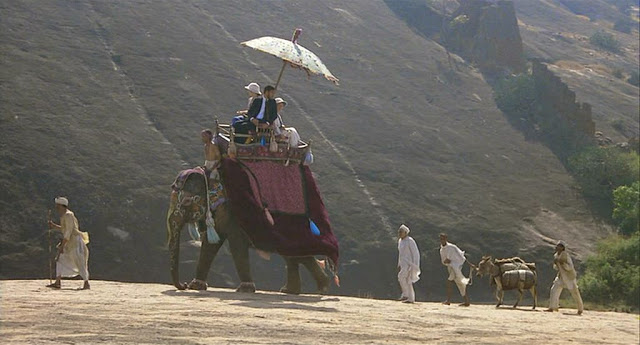The Caves” section A Passage to India is an extended metaphor for the irreconcilability of the English and the Indians in India. The excursion to the Barabar Caves is a series of miscues, misunderstandings, and failed friendships between Dr. Aziz, Mrs. Moore, and Adela Quested. Looking back, Aziz calls it a “horrible, senseless picnic.”
Defying convention, Forster upends the conventional expectation that a picnic is associated with joy, fun, and good food.
Aziz’s casual invitation to Miss Quested and Mrs. Moore, but Aziz feels obligated to follow through. It never occurs to him that the women might have no interest in a picnic at the Caves. He’s also worried about the expense, scheduling, transportation, and food. Because Aziz knows little about the caves, he invites his friends Narayan Godbole and Cyril Fielding to support and conversation depth. To his surprise, Quested and Moore accept his invitation because they feel obligated and cannot refuse without insulting him.
Godbole and Fielding arriving together just miss the train. The train ride is free, but it is a classless ride, which upsets Aziz, who thinks the British mind it. But the women don’t seem to mind; it’s just part of their condescension. While traveling, Aziz insists he must provide breakfast and cooks poached eggs, toast, and tea that he prepares in the lav.
Aziz thought an elephant taxi would be a treat, but the women were appalled and frightened. Settle in the shade below the Caves; another breakfast is served because Aziz believes “English people never stop eating and that he had better nourish them every two hours until a solid meal was ready.” The women are puzzled, but Aziz mistakenly assumes that his hospitality is appropriate.
The caves disappoint because they are dark, dank, and rank. “Bending their heads, they disappeared one by one into the interior of the hills. The small black hole gaped where their varied forms and colours had momentarily functioned. They were sucked like water down a drain.” When Mrs. Moore panics when separated from Aziz and Quested and suddenly touched by “some vile naked thing.” “For an instant, she went mad, hitting and gasping like a fanatic. For not only did the crush and stench alarm her; there was also a terrifying echo.”

Dr. Aziz, Mrs. Moore, and Adela are at the picnic table. David Lean. A Passage to India (1984).
After a lunch of mutton chops, Mrs. Moore (recovering from her panic attack) remains behind while Aziz and Quested return to the caves. As they walk, Aziz and Quested are deep in thought. Quested thinks of her impending marriage and realizes she does not love Ronny Heaslop, and going on with their relationship will be disastrous. Out of sorts, Quested feels trapped in a “tedious expedition” and moves on pointlessly about the cave because she must.
Trying to make conversation, Quested asks about Aziz’s wife. Aziz lies impulsively, and though she is dead, he says she is alive. Asking if Aziz has more than one wife, he is insulted, probably because he has lied. Feeling panicky, he steps away for a cigarette, and when he returns, he cannot locate Quested.
From the cave’s zigzags, Aziz catches a glimpse of Quested below him, talking to some people in a car. Surprisingly, he returns to the picnic camp without questioning Quested’s departure. When Fielding arrives concocts another lie, telling Fielding, “We had an interesting talk with our guide, then the car was seen, so she decided to go down to her friend. Forster suggests that Aziz’s lies are not lies, just a reordering of events to attempt to be sensitive.
Prodded by Fielding, Aziz says that he is not bothered by the British “if they let me get on with my profession and not be rude to me officially, I don’t ask for more.” Fielding counters that Aziz wants more, so he takes Quested and Moore on the picnic. Aziz answers, “this picnic is nothing to do with English or Indian; it is an expedition of friends.” Unfortunately, Aziz is mistaken, and arriving at Chandrapore, the Colonial police arrest him for molesting Quested.
The molestation is a lie instigated by the Brits that has far-reaching unpleasant consequences that is a signal of failed colonial rule.* Quested betrays her sense of self and irreparably undermines her relationship with Heaslop and in Colonial society. Aziz’s friendship with Fielding is wrecked. Mrs. Moore’s health is affected, and she dies at sea during her return to England. Ironically, when acquitted, Aziz becomes a local hero.
*Forty-five years after the setting of Forster’s novel, British Colonial rule ended. In August 1947, India became an independent nation.
See D E. M. Forster. A Passage to India. London /New York Edward Arnold/Harcourt Brace 1924; David Lean. A Passage to India (1984). Screenplay by David Lean based on E. M. Forster’s novel and Santha Rama Rau. A Passage. New York: Harcourt, Brace & World, 1961

